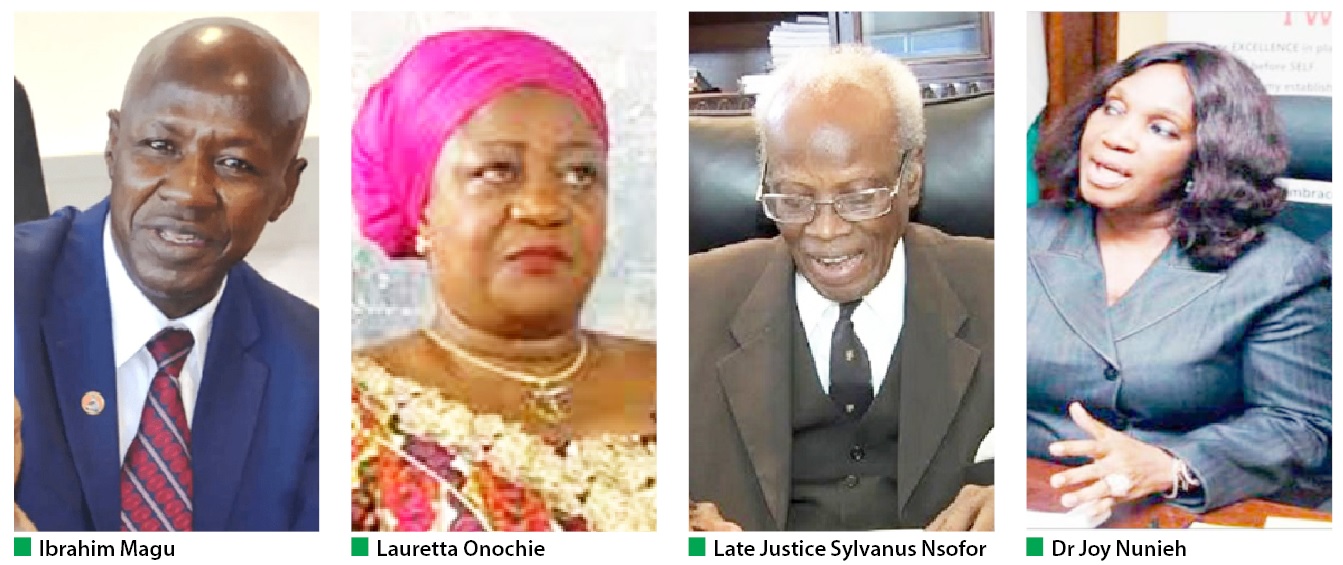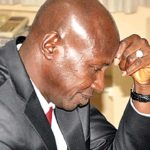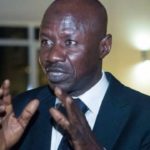Since President Muhammadu Buhari assumed office on May 29, 2015, he has forwarded a lot of nominations to the Senate for confirmation. While many of the nominees were confirmed, few others were rejected for various reasons. The latest is Lauretta Onochie, a presidential aide on new media. Daily Trust on Sunday lists 13 of such nominees rejected by the Red Chamber in the last six years of the Buhari administration.
Olatokunbo Ajasin
Ajasin is the son of the late first civilian governor of Ondo State, Adekunle Ajasin.
- Residents recount ordeals after bandits’ leader sacked Zamfara villages
- I’ll deal with my deputy if he dares me, Matawalle goes tough
His nomination in 2016 to represent his state on the Board of the Niger Delta Development Commission (NDDC) was rejected on the ground that his appointment would contravene the NDDC Act, 2007.

He is from Owo, a town that is not among the oil-producing areas in Ondo.
Section 2(1) (b) of the NDDC Act stipulates that nominees for the Board of the commission must be from communities where oil is produced.
Before his screening by the Senate Committee on NDDC, Ajasin’s nomination had faced stiff opposition from Ilaje and Ese Odo people, whose communities produce oil. They also protested to the venue of the screening.
The committee’s chairman, Senator Peter Nwaoboshi, said his panel received over 30 petitions against Ajasin’s nomination.
When he appeared before the screening committee, Ajasin was asked whether he was from an oil-producing area and he said no.
Donatus Eyinnah
The Senate also declined the nomination of Eyinnah as a Board member of the NDDC in 2016 for the same reason that he was not from the oil-producing areas in Abia State.

When he appeared before the committee, he was simply asked whether he was an indigene of the oil-producing area of the state. He responded in the affirmative, but the chairman simply referred him to a document from Shell Petroleum Development Company and the Office of the Surveyor General of the Federation, which both confirmed that the nominee was not from an oil-producing area.
Igo Weli
Weli’s nomination as a Board member of the NDDC could also not scale through Senate screening.

The letter from President Buhari in 2016 had nominated Mr Weli to represent Niger Delta on the NDDC Board, but the committee argued that all the states from the region had been adequately represented and his confirmation would amount to duplication.
Ezekiel Yisa Benjamin
In 2016, the Red Chamber also rejected the nomination of a former Speaker of the Kwara State House of Assembly, Benjamin, as a non-executive commissioner of the Nigerian Communications Commission (NCC).

Benjamin’s nomination was rejected because his background as a trained nurse “will not put him in good stead to effectively cope with the dynamics of the communications sector if his nomination is confirmed,” according to the screening panel.
Aliyu Saidu Abubakar
Abubakar was disqualified as a non-executive commissioner of the NCC in 2016 because he could not produce any credible educational certificate for the screening committee to verify.
He got into trouble when the screening panel confronted him with photographs of his frequent protests at the gate of the National Assembly, and calls that the Senate be scrapped.
During the screening, the committee asked if he still believed in his calls. He re-echoed his position that the existence of the Senate was only wasting the country’s resources.

The chairman of the committee, Senator Gilbert Nnaji, said Abubakar’s response to questions asked by the committee portrayed him as “a candidate who is not prepared for the demands of office such as required of a non-executive commissioner on the Governing Board of the NCC.”
“Mr Abubakar could not produce any credible educational certificate for the committee to verify at the screening. He obviously lacks the professional and educational disciplines provided in Section 7(1) (a-h) of the Nigerian Communications Act 2003, which stipulates the qualification for the commission’s Board,” the lawmaker said.
Justice Sylvanus Nsofor
In 2017, the Senate rejected the nomination of an 82-year-old retired judicial officer, Justice Sylvanus Nsofor, as non-career ambassador.
Justice Nsofor, who retired from the judiciary in 2005, looked frail and feeble when he appeared before the screening panel. He told senators that information technology was not meant for people of his age, and failed to recite the national anthem.

When it was suggested that at 82 he might be too old to be an ambassador, he retorted: “Go and ask Mugabe, who is still working.”
The chairman of the panel, Senator Monsurat Sunmonu, said Nsofor was not rejected because of his age but rather because of his satirical responses to questions and failure to answer many other questions.
Few months after, President Muhammadu Buhari re-forwarded his name to the Senate for the same ambassadorial job and he was confirmed.
After his confirmation, he was deployed to the United States as Nigeria’s ambassador. He died in 2020 at the age of 85.
Daodu Igbekele Jacob
Jacob, who hails from Ondo State, had his nomination as non-career ambassador rejected by the Red Chamber in 2017 due to unfavourable security report on him by the Department of State Services (DSS).
The screening committee, chaired by Senator Sunmonu, said there was an adverse report on the nominee’s suitability for appointment as an ambassador.
“Although the nominee has acquired experience from his previous workplaces, his responses during the screening exercise did not have direct bearing on the issues raised, and were not satisfactory to the committee’s expectation,” the lawmaker said.
Dr Joy Nunieh
On November 15, 2019, the Senate rejected the nomination of Dr Joy Nunieh as a Board member of the NDDC.
Nunieh, who hails from Rivers State, was nominated on October 29, 2019, alongside 14 others.

However, the Senate rejected her nomination because she failed to appear before the Senate Committee on Niger Delta for screening.
She was later appointed Acting Managing Director of the NDDC but was eventually sacked by President Muhammadu Buhari in 2020 following the faceoff she had with Senator Godswill Akpabio.
Ibrahim Magu
Another Buhari’s man that was rejected by the Senate is Magu, a former acting chairman of the Economic Financial Crimes Commission (EFCC).
The Senate rejected the confirmation of Magu as the substantive chairman of the EFCC on two occasions. Buhari presented his nomination for confirmation in December 2016 but he was rejected by the lawmakers. The rejection followed a report of the DSS, which indicated that he lacked the integrity to lead the country’s anti-corruption agency.
Barely three months after the Senate rejected Magu’s nomination, Buhari re-presented him on March 15, 2017, but he was again rejected.
Senator Dino Melaye drew the attention of the Senate to a DSS report on the then EFCC boss, dated March 14.

“In the light of the foregoing, Magu has failed the integrity test and will eventually constitute a liability to the anti-corruption stand of the current government,” the DSS report read by Mr Melaye, stated.
Although Magu had answered to the satisfaction of the lawmakers’ questions, senators challenged his suitability, given the report against him.
But he questioned the credibility of the DSS, which he said dispatched two reports on him with varying contents the same day.
At the end of the day, Magu’s confirmation was turned down.
Raheem Muedeen Olalekan
On December 5, 2019, the Senate rejected the nomination of Raheem Muedeen Olalekan, who hails from Osun State, as a resident electoral commissioner.
His rejection was based on the petition against his nomination, which he could not satisfactorily defend during screening.
The chairman of the screening panel, Senator Kabiru Gaya, told his colleagues that the nominee was accused of being a member of the All Progressives Congress (APC).
“Yes, I am a member of the All Progressives Congress,” he told the screening panel when he was asked whether he belonged to any political party.
He added that he had contested for local government chairmanship in Osogbo, Osun State and served as a campaign coordinator of a gubernatorial candidate.
Nnamdi Anyaechie
Anyaechie’s nomination as a member of the National Assembly Service Commission was rejected on February 5, 2020.

The nominee, according to the screening committee, did not show up for confirmation hearing.
Lauretta Onochie
The latest on the list of Buhari’s nominees rejected by the Senate is Lauretta Onochie, the Special Assistant to President Muhammadu Buhari on New Media.
Her nomination as a commissioner of the Independent National Electoral Commission (INEC) in October 2020 was greeted with massive outrage, with many opposition politicians and civil society groups calling for her rejection on the ground that she was too partisan to serve in a sensitive institution like the INEC.
She was also accused of being a card-carrying member of the APC, a claim she denied three times during her screening.

She was disqualified earlier this month based on federal character principle.
The committee’s chairman, Senator Kabiru Gaya, said there was a serving commissioner of the INEC from Delta State, where Onochie hails from, so confirming her appointment would violate a constitutional provision.
By Abdullateef Salau, Itodo Daniel Sule & Haruna Ibrahim

 Join Daily Trust WhatsApp Community For Quick Access To News and Happenings Around You.
Join Daily Trust WhatsApp Community For Quick Access To News and Happenings Around You.


